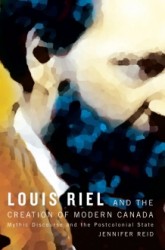Article Origin
Volume
Issue
Year
Louis Riel and the Creation of Modern Canada: Mythic Discourse and the Postcolonial State
Jennifer Reid
Published By University of Manitoba Press
Pages: 314
Review by Christine McFarlane
Jennifer Reid’s book, “Louis Riel and the Creation of Modern Canada” gets readers to look at a complex and comprehensive history of the Metis peoples, Louis Riel and the ensuing response to Riel’s life and work in the modern and political entity we call Canada.
Louis Riel as a revolutionary and as Canada’s most celebrated ‘traitor’ has been a highly contested subject of debate since Riel’s trial, the Red River uprising of 1869-70 and the Northwest Rebellion of 1885.
Reid notes that the uprisings at Red River and in the Northwest have been the subject of more books than any other in Canadian history; and more histories, biographies, novels and poetry have been written about Riel than any other Canadian figure.
Reid examines Riel’s religious background, the mythic significance that has been ascribed to him and how these elements tie into and influence Canada’s search for a national identity. Reid argues that a lot of why Louis Riel has become such an iconic Canadian historical figure has to do with the concepts of nationalism and the nation in the Canadian situation.
She gives a brief overview of the Metis uprisings and the area in which they transpired, speaks about the historically contested colonial space that became the Canadian West and delves into how all these issues tie into the Canadian mythic imagination.
The book provides a framework for readers to rethink the geopolitical significance of the modern Canadian state. We are also given a glimpse into how the historic role of Confederation played out in establishing the country’s collective self-image, and the narrative space through which Riel’s voice speaks in regard to these issues.
It is also intriguing to read how “in seeking a legitimate place for a Metis presence in Canada, Riel set forth a pattern and paradigm that became the template for all the major subsequent attempts to order the many and various regional, Euro-American ethnics, Metis, and Aborigines, as well as the various economic interests into some kind of ordered Canadian entity.”
“Louis Riel and the Creation of Modern Canada: Mythic Discourse and the Postcolonial State” is an examination of myth and history. Reid examines in great detail “the mythicization of both Riel and the rebellions that have betrayed a desire on the part of many Canadians to locate a source of collective identity in a figure, and an event that are not only historical, but profoundly symbolic and enmeshed in consciously religious language.”
This book is a great read for those with an interest in history, but can be difficult to read for those who do not often engage in historical texts that examine identity alongside a nationalist discourse.
- 2658 views

